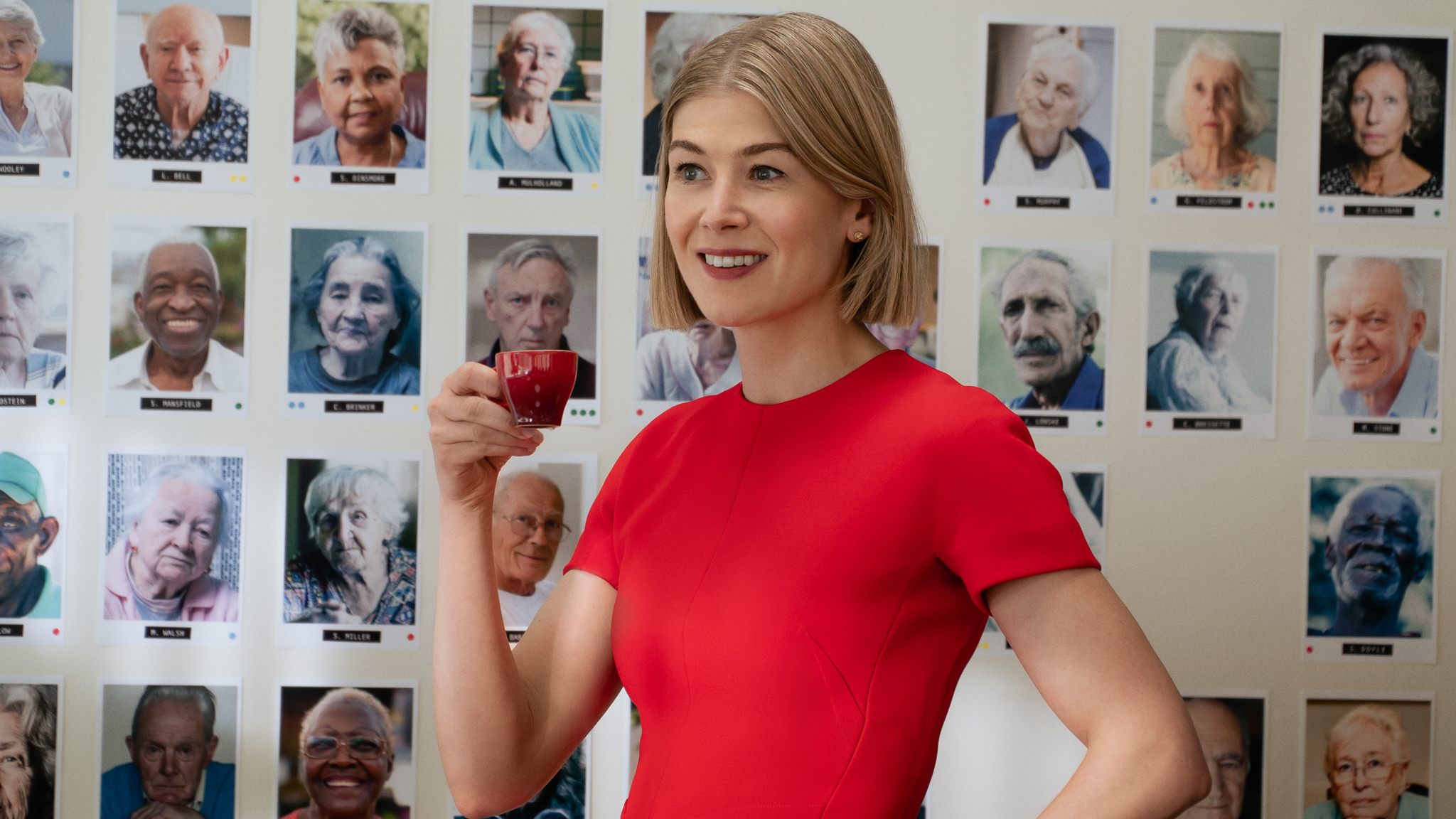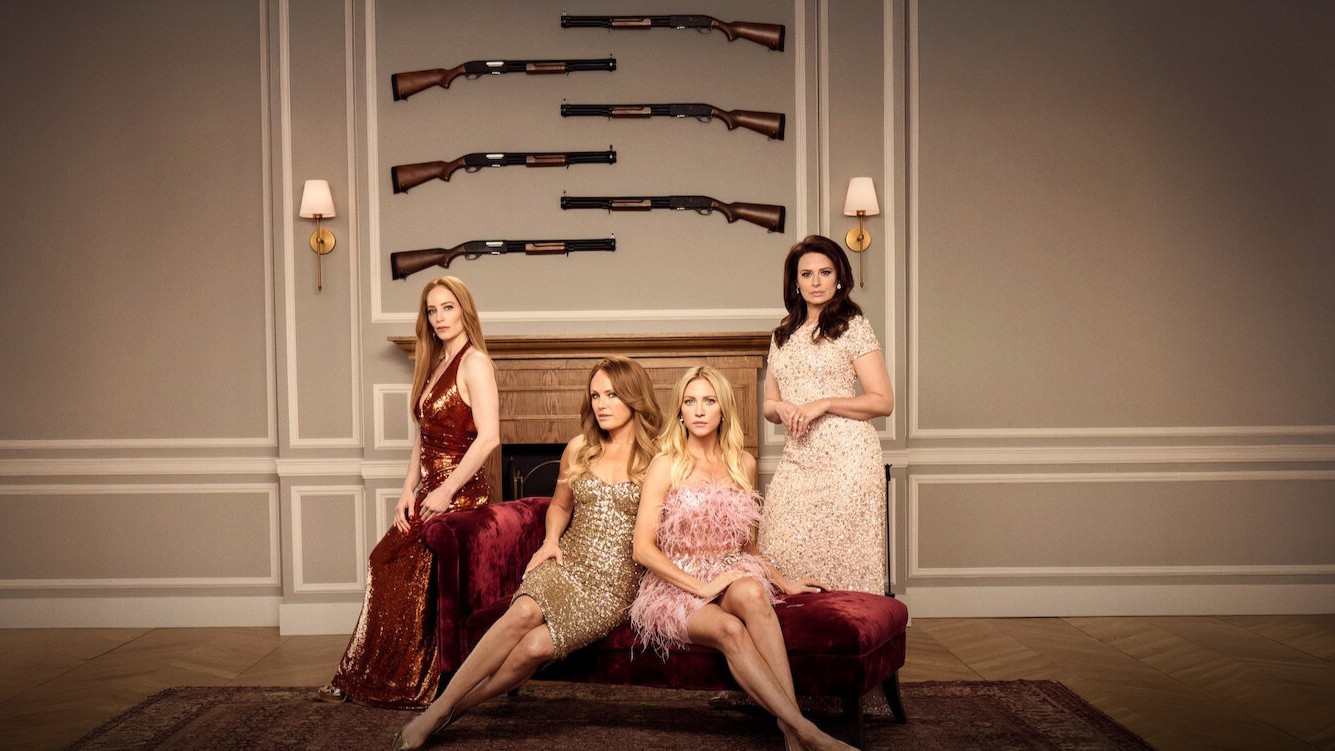'I Care A Lot' isn't praising "girlbosses" the way you think it is
Netflix's scathing 'I Care a Lot' shows a wildly cruel con-woman at work as she positions herself as a feminist girlboss.

This post contains spoilers for I Care A Lot.
In I Care a Lot, the latest original film to drop on Netflix, Marla Greyson, played by Rosamund Pike, has a cunning plan. A lifelong schemer, her latest con is her most lucrative: she persuades judges to appoint her as the legal guardian to elders living alone with cash to spare. Abusing the system to spin the lie that these people cannot take care of themselves, Marla places them in an assisted living facility, cuts off all contact to the outside world, then sells their assets for her own personal gain. It's a horrendously cruel plan, even by the standards of scammers, and yet it works for two reasons: one, the basic concept of guardianships in this manner is perfectly legal, and two, Marla is incredibly adept at making it seem as though her choices are purely altruistic.
It's been fascinating to read some of the audience responses to I Care a Lot from those who feel that the film is too sympathetic towards Marla. Over on Rotten Tomatoes, where the movie's audience score greatly differs from the generally positive critical numbers, a lot of brand-new commenters seem to have created accounts just to rank it half a star. Anyone familiar with how women-centered films tend to suffer the most with online reviews in this manner will know this tactic all too well. One such review bemoaned that I Care a Lot was "another stupid movie about feminism power. The unstoppable force of women empowerment bs." One has to wonder if this person actually saw the film, because this wildly inaccurate reading of I Care a Lot is almost impressive. Indeed, it greatly misunderstands what makes I Care a Lot so good. It's not a film of "women empowerment": it's a scathing takedown of corporate feminism.
Marla has no sympathetic backstory to explain her turn towards a life of crime. She is not seen as a project for a good romance to fix (her girlfriend Fran is in on the scams too.) There's no moment in the film where she expresses even a modicum of regret for the ways she ruins these innocent people's lives. She is just straight-up evil, a proudly irredeemable villain who gets away with it because she's good at what she does. Not only that but she's operating in a system that giddily allows her to do this. Conservatorships and guardianships are legal. You can have your life signed away by a judge without you ever having to appear in court.
As director J Blakeson explained, this abuse of elderly guardianship rulings is commonplace he used this very real concept as a way to explore notions of ambition and the commodification of human life itself. To Marla, these elderly people aren’t someone’s parent or grandparent. They’re not individuals with well-lived lives or dreams. They’re piggy banks to violently smash open without a second thought.
In the opening scene of I Care a Lot, Marla is in court defending her right of guardianship over an elderly woman whose son has tried to gain access to her. Her manipulations of her own femininity and the supposedly inherent empathy of womanhood make her case an easy sell to the judge (albeit one who’s in on the game.) The son snaps and calls her a “bitch” and in that moment, Marla knows she’s won. She uses that sexist slur as a battering ram, a means to strengthen this self-built image of her work as the good deeds of a selfless woman who’s fighting for the nice guys against meanies and bullies like the woman’s son. It works because, on the surface, the dynamic is all too familiar. Every woman you know has had at least one experience where a guy has called them a bitch, and it’s usually for a totally innocuous reason.
We’ve been swamped with stories over the past decade or so of “badass ladies” fighting the patriarchy to become powerful CEOs or businesswomen who make lots of money. Really, this is our new default mode for mainstream feminist success. It’s Sheryl Sandberg’s Lean In, or Sophia Amoruso's #Girlboss. It's the notion that all that women need to do to defeat centuries of patriarchal cruelty is be as rich and bossy as men. Marla embodies this to the nth degree, from the pastel lady CEO outfits to the way she tries to claim she is a "lioness" for doing what she does to these people.
The latest updates, reviews and unmissable series to watch and more!
This, obviously, isn’t feminism, but to late-stage capitalism, it’s the only acceptable version of female liberation they want to embrace. They love the idea of a Facebook COO telling women that they just need to be more assertive because doing so overlooks systemic misogyny and all the women on the lower rungs of the ladder that you have to lean on to get there. Sophia Amoruso can charge $500 - $1400 for access to events where she can condescendingly tell millennial women how to achieve their personal goals, and the neon glow of the #Girlboss logo is enough to distract from the toxic work culture she fostered at Nasty Gal, including accusations that women were fired for being pregnant. Marla is definitely the most insidious extension of this concept but it’s not that far from the watered-down bastardization of feminist rhetoric for personal gain. As long as she’s the one on magazine covers being hailed as a genius CEO, the illusion of the girlboss is maintained. Just keep the ruined elderly people out of sight.
Capitalism is an inherently exploitative system. It’s profit above all else, and that ethos is designed to hurt. Anyone who has ever dealt with the American healthcare industry or fought as part of a labor union can attest to the smothering restraints of capitalist rule. I Care a Lot is very much a movie of our time in that respect, a story of the narcissism and destructive force of a system that sees the pain of the many for the profit of a few as the ultimate end goal. Marla’s appropriation of buzzy lady CEO slogans and her occasional defense that her cons are part of her fierce feminist gain only work because we’ve been conditioned to accept that as the norm. Hell, even Marla doesn’t believe her own bullshit. it’s a scam, just like everything else she does.
Kayleigh is a pop culture writer and critic based in Dundee, Scotland. Her work can be found on Pajiba, IGN, Uproxx, RogerEbert.com, SlashFilm, and WhatToWatch, among other places. She's also the creator of the newsletter The Gossip Reading Club.


